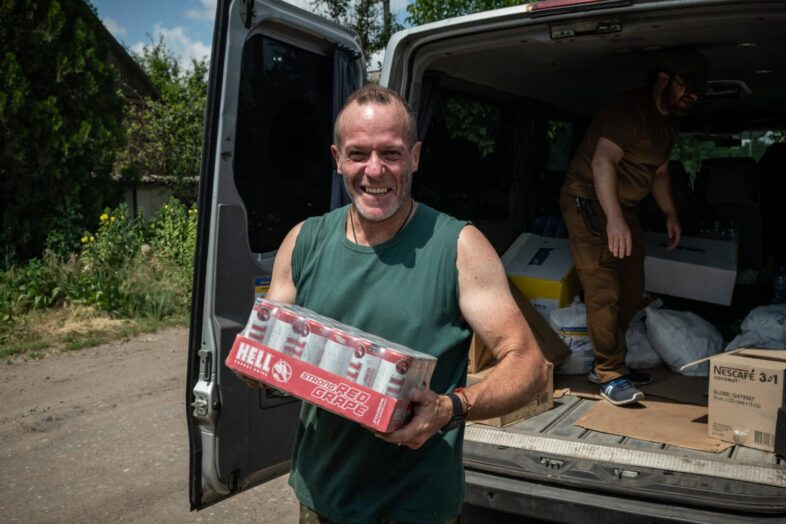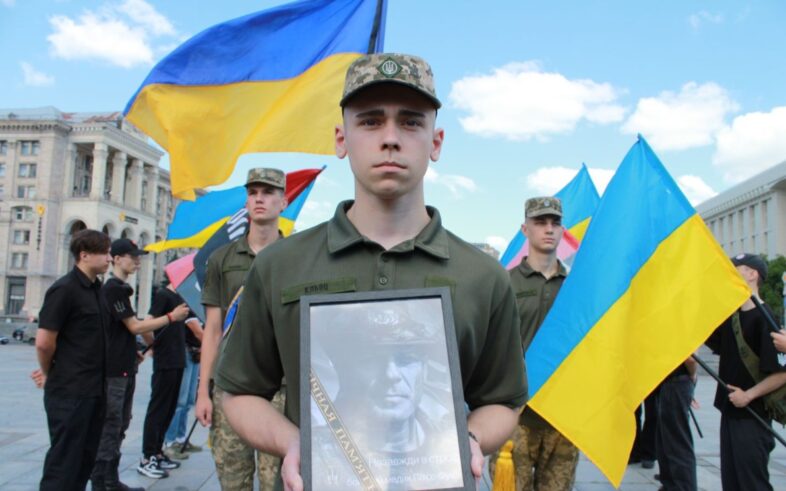Unfortunately, I never had the chance to meet him. I didn’t know his age, his passions, or his dreams. But when the greatest calamity—war—descended upon my country, he left his peaceful life in London to come here. He came to help, heal, save, and offer hope. He embraced Ukraine with all his heart and sacrificed his life for it. I am left with a deep sense of losing a true friend—one I never knew personally but will never forget. Peter Fouche – a volunteer, a medic, a warrior. A lover of life and an eternal optimist, he saved over 200 lives before falling in battle near Chasiv Yar. It’s been 40 days since his bright soul left us for the heavens.
***
Compassion: the mark of true men
“No one in the world is facing the kind of war that’s happening in Ukraine. Ukraine is fighting for its very survival, for its right to exist. These people are titans. I have to be there. I have to help them.” This was how Peter Fouche explained his decision to go to Ukraine to his family. He made this choice in the early days of the full-scale invasion when the reports from the East were deeply troubling. His family was concerned: they worried for their son and brother. “You can help from here, from a distance, and stay safe,” they gently suggested. But Peter was determined.
The only thing that could sway him was his daughter’s words. “You are my child, and I love you more than anything in the world,” he told his 15-year-old daughter, Nicola. “You’re fortunate to live in a safe country without war. But in Ukraine, people are suffering, and children are dying. I want to protect them. Please try to understand.”
“Go, Dad. But take care of yourself,” Nicola replied. “And come back…” Her words gave him both resolve and comfort.
Peter, having committed to volunteering, embarked on a humanitarian mission in early March to a country he had never visited before. He remembered meeting an American journalist at the Ukrainian border who was heading the other way. “Think carefully. Think twice. You’re heading into hell,” the reporter warned him candidly.
Peter tirelessly delivered food and water to frontline villages and cities while also assisting in evacuating civilians from combat zones. He established Project Konstantin, a volunteer organisation named after a fallen comrade, to mobilise various resources in support of Ukraine. In Brovary, near Kyiv, he played a key role in constructing the first field hospital for the wounded. Peter completed first aid training and joined the territorial defence forces, recognising that his presence at the front would be far more impactful. As he put it, “If we support the army and the front more effectively, civilians in the rear will suffer less and feel more protected.”

“I’ll come back and destroy that tank for you. Hold on, brother…”
Peter’s extensive experience as a police officer proved crucial in this new context. Years of dedicated service had honed his ability to react swiftly, make split-second decisions, and assess situations with precision—all essential skills now required in a battlefield environment. He found himself in the midst of intense combat, where he helped evacuate the wounded from the front lines, administered first aid, and adapted to the harsh realities of war.
In one of his rare interviews, Peter recounted a particularly harrowing experience: “Once, while transporting a wounded soldier, I noticed a strange burning smell,” he said. “I looked around and realised it was phosphorus burning inside the soldier’s body. There was no time to waste. I grabbed my combat knife and, trying to shield the soldier’s eyes from what I was doing, removed the phosphorus from his thigh. I had never done anything like this before. Before this war, I could barely handle the sight of blood. I had to learn all of this on the fly, right here in the field…”
Friends and comrades recall how Peter always sought to lighten the mood and offer comfort to those wounded in critical conditions. He would clasp their hands and repeat like a mantra, “You will live. I’m here, and I’ll save you. I’ll take you to a safe place, and we’ll go home together. Then I’ll return and destroy the tank that shot at you.”
“These individuals are extraordinary. To me, they are true heroes,” Peter said of the people he helped evacuate from the battlefield. He saved over 200 lives. Though he knew only a few words and simple phrases in Ukrainian, he spoke the language of kindness and compassion fluently—an art that no textbook can teach but requires a genuine gift.
Peter served in numerous hotspots of the Russian-Ukrainian war. He participated in liberating Kyiv, Chernihiv, and Kharkiv regions and endured the inferno of Donetsk. His call sign was ‘Hasta la Vista’.
“Peter was known as a medic and a volunteer, but few realise he was also a skilled sniper. Born and raised in South Africa, Peter developed a passion for weapons early on. He was a member of his school’s shooting club and later joined the police, serving in a sniper unit. His expertise and dedication were invaluable to us. I don’t think I’ve met anyone as committed and sincere in their fight for Ukraine’s victory as Peter. His loss is deeply felt by me and my comrades,” says Stas, a warrior with the call sign Viter.
Stas, my fellow countryman and childhood friend, travelled from the front lines to Kyiv to bid Peter farewell and pay his respects. He spoke of the remarkable “Briton who carried Ukraine in his heart,” who defended our freedom and dignity as if they were his own.
“Only a true Ukrainian can love Ukraine like that. And Peter was one of them…”
Peter was not just a policeman but also a skilled builder. He would often say, “I’m a carpenter by trade. I know that after the war, we’ll build new, beautiful homes for those who have lost theirs.” He planned to remain in Ukraine after the victory, dedicated to helping rebuild cities devastated by Russian aggression. He expressed his intention to assist in the reconstruction of Bakhmut and aimed to obtain Ukrainian citizenship. He frequently remarked on the warmth of the Ukrainian people. “Once in Druzhkivka, Donetsk region, I met an 80-year-old grandmother. ‘Where are you from, my son?’ she asked. When she learned I was from Britain, she bowed deeply as if I were royalty. I’ll never forget that moment… It moved me to tears.”
“Peter was a deeply emotional person. In the 67th Brigade, he worked alongside us on sniper duties; before that, he had spent several years as a paramedic, saving soldiers’ lives. Unfortunately, he couldn’t save himself… For all of us, this is a profound emotional wound,” says Peter’s comrade, known by the call sign Tіn.
“They say heroes never die, but that’s not true. People like Peter do die. There are very few individuals as unique as he was,” reflects Roman, a soldier with the call sign Okhotnik. “Just a few minutes of conversation with him was enough to grasp what kind of person he was. He always had a smile on his face. I remember him from the Kharkiv region. This is a tremendous loss for us… Out of our group of six, only three remain. I recall a time when we had a few hours of downtime, and Peter invited us to a picnic. He set up a campfire, we brought our rations, and we all cooked some makeshift kebabs. I barely spoke any English, and Peter didn’t know Ukrainian, but we communicated effortlessly without words. I brought out a thermal imager to scan the area and spotted a beaver swimming in the river. I told Peter, ‘There’s a beaver,’ and he immediately started filming with his phone, his excitement palpable: ‘Roma… O-o-oh, it’s a beaver, look!’ When Peter died… I couldn’t accept it. I kept telling myself it couldn’t be true; it just couldn’t happen.”
“He could do anything. He took on every task, even those he hadn’t tried before. His loyal dog was always by his side. Every morning, Peter would grab his backpack and his dog and head out for a walk. That image of him strolling with his dog and a smile on his face is still vivid in my mind. Talking to him had a way of uplifting your spirit. For us, his comrades, Peter’s death is an immense loss…”
In April this year, 80-year-old Miss Rose embarked on a remarkable journey from South Africa to Ukraine to visit her son. Thanks to the relentless efforts of volunteers and journalists, she made the trip despite her significant health issues. She braved long distances and potential dangers to spend several days with her son near the combat zone, enduring nearly Spartan conditions. Her decision to be there, supporting those who are struggling the most, is a testament to the deep bond she shares with her boy and the value she places on being by his side. “My mother taught me to carry God in my heart, to love and care for others,” Peter once said in his interview. “God is love, and love conquers all.”

Peter had a final wish for his ashes: to be scattered in Kyiv, in the Donetsk region where he fought, and in London if his death were to come. His family, friends, and comrades honoured his request. Each time the mournful strains of Plyve Kacha [a century-old Ukrainian song symbolising resistance and love for freedom – ed.] fill the air over Kyiv’s Maidan, marking a moment of silence for our heroes, I find myself reflecting on the invisible presence of those who loved Ukraine above all else. They gave their most precious gift for it.

